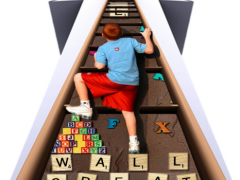According to NAAL data, reading proficiency remains a significant bottleneck to social and economic progress for tens of millions of U.S. adults. Adults struggling with literacy (in their native language) are not only struggling with the inherent difficulties involved in literacy learning, they are struggling with what they learned in the past that is sabotaging […]
Archive | Artificial Learning
NO MORE INSTRUCTIONAL CONFUSION, GUESSING, OR MIND-SHAME!
NO MORE INSTRUCTIONAL CONFUSION, GUESSING, OR MIND-SHAME! Learning to Read is 1-2-3 (and free!): 1) Click on any word. 2) Try to read word in Pop-up. Can’t? Click word in Pop-up. 3) Repeat Step 2 as needed. Click on any word below and follow the steps: 1,2,3. to ice eye have know meow wolf pour fury idea heart acres […]
Share this:
- Share on Facebook (Opens in new window) Facebook
- Share on X (Opens in new window) X
- Share on LinkedIn (Opens in new window) LinkedIn
- Share on Pinterest (Opens in new window) Pinterest
- Share on Pocket (Opens in new window) Pocket
- Share on Reddit (Opens in new window) Reddit
- Share on Telegram (Opens in new window) Telegram
- Share on Tumblr (Opens in new window) Tumblr
- Share on WhatsApp (Opens in new window) WhatsApp
- Email a link to a friend (Opens in new window) Email
- Print (Opens in new window) Print

Early Learning Trajectories: The Obstacle Course Wall
Note: See Demo at bottom of page Convergence Point 1 – Decades of social and economic research, beginning with the Coleman Report and since including Heckman, (Nobel Prize winner) Rolnick (Ex. V.P. of the FED), Hanushek (Hoover Institute) and many others, and decades of developmental neuroscience research, most notably as compiled by Harvard’s Jack Shonkoff, have converged and coalesced into […]
Share this:
- Share on Facebook (Opens in new window) Facebook
- Share on X (Opens in new window) X
- Share on LinkedIn (Opens in new window) LinkedIn
- Share on Pinterest (Opens in new window) Pinterest
- Share on Pocket (Opens in new window) Pocket
- Share on Reddit (Opens in new window) Reddit
- Share on Telegram (Opens in new window) Telegram
- Share on Tumblr (Opens in new window) Tumblr
- Share on WhatsApp (Opens in new window) WhatsApp
- Email a link to a friend (Opens in new window) Email
- Print (Opens in new window) Print
THE END OF ABSTRACT READING INSTRUCTION
Kids in the future will not be ‘taught’ to read. Every interaction with every word on every device will support them learning to read on their own. We only sense now. We only feel now. We only think now. We only learn now. We are naturally ‘wired’ to learn from what is happening on the living edge of now. Humans learn best […]
Share this:
- Share on Facebook (Opens in new window) Facebook
- Share on X (Opens in new window) X
- Share on LinkedIn (Opens in new window) LinkedIn
- Share on Pinterest (Opens in new window) Pinterest
- Share on Pocket (Opens in new window) Pocket
- Share on Reddit (Opens in new window) Reddit
- Share on Telegram (Opens in new window) Telegram
- Share on Tumblr (Opens in new window) Tumblr
- Share on WhatsApp (Opens in new window) WhatsApp
- Email a link to a friend (Opens in new window) Email
- Print (Opens in new window) Print

“The Magic Ladder”
The Magic Ladder is a system of tools (free to schools and families) that has the potential to fundamentally improve the learning trajectories of more than half of the children in the U.S.
Share this:
- Share on Facebook (Opens in new window) Facebook
- Share on X (Opens in new window) X
- Share on LinkedIn (Opens in new window) LinkedIn
- Share on Pinterest (Opens in new window) Pinterest
- Share on Pocket (Opens in new window) Pocket
- Share on Reddit (Opens in new window) Reddit
- Share on Telegram (Opens in new window) Telegram
- Share on Tumblr (Opens in new window) Tumblr
- Share on WhatsApp (Opens in new window) WhatsApp
- Email a link to a friend (Opens in new window) Email
- Print (Opens in new window) Print
How Shyness Affects Learning Spoken and Written Language
When a child is shame-averse to expressing what they are reading, they are, necessarily, less able to learn to read.
Share this:
- Share on Facebook (Opens in new window) Facebook
- Share on X (Opens in new window) X
- Share on LinkedIn (Opens in new window) LinkedIn
- Share on Pinterest (Opens in new window) Pinterest
- Share on Pocket (Opens in new window) Pocket
- Share on Reddit (Opens in new window) Reddit
- Share on Telegram (Opens in new window) Telegram
- Share on Tumblr (Opens in new window) Tumblr
- Share on WhatsApp (Opens in new window) WhatsApp
- Email a link to a friend (Opens in new window) Email
- Print (Opens in new window) Print
Re: Dyslexics suffer from a slower processor
This is an important step towards better understanding the underlying processing issues involved in ‘reading improficiency’ (affecting 6 in 10) as well as ‘dyslexia’ (affecting 1 in 10)
Share this:
- Share on Facebook (Opens in new window) Facebook
- Share on X (Opens in new window) X
- Share on LinkedIn (Opens in new window) LinkedIn
- Share on Pinterest (Opens in new window) Pinterest
- Share on Pocket (Opens in new window) Pocket
- Share on Reddit (Opens in new window) Reddit
- Share on Telegram (Opens in new window) Telegram
- Share on Tumblr (Opens in new window) Tumblr
- Share on WhatsApp (Opens in new window) WhatsApp
- Email a link to a friend (Opens in new window) Email
- Print (Opens in new window) Print
Update: Children of the Code Release: “The Brain’s Challenge”
“THE BRAIN’S CHALLENGE” is the centerpiece of the Children of the Code project and illustrates the main challenge underlying learning to read difficulties in the English language.
Share this:
- Share on Facebook (Opens in new window) Facebook
- Share on X (Opens in new window) X
- Share on LinkedIn (Opens in new window) LinkedIn
- Share on Pinterest (Opens in new window) Pinterest
- Share on Pocket (Opens in new window) Pocket
- Share on Reddit (Opens in new window) Reddit
- Share on Telegram (Opens in new window) Telegram
- Share on Tumblr (Opens in new window) Tumblr
- Share on WhatsApp (Opens in new window) WhatsApp
- Email a link to a friend (Opens in new window) Email
- Print (Opens in new window) Print
Neuroscience: Neural Correlates of Math Anxiety
Since posting my previous piece (When Learning Hurts – Toxic Learning) earlier this week, another blog focused on medical neuroscience posted a great overview of math anxiety called “Brain Markers of Math Anxiety“. The post refers to a study “The Neurodevelopmental Basis of Math Anxiety” that has identified the neural correlates of math anxiety for […]
Share this:
- Share on Facebook (Opens in new window) Facebook
- Share on X (Opens in new window) X
- Share on LinkedIn (Opens in new window) LinkedIn
- Share on Pinterest (Opens in new window) Pinterest
- Share on Pocket (Opens in new window) Pocket
- Share on Reddit (Opens in new window) Reddit
- Share on Telegram (Opens in new window) Telegram
- Share on Tumblr (Opens in new window) Tumblr
- Share on WhatsApp (Opens in new window) WhatsApp
- Email a link to a friend (Opens in new window) Email
- Print (Opens in new window) Print
IQ Learning
Working Memory: IQ is not fixed. For better and worse, learning changes IQ. Because intelligence both shapes and is shaped by learning our conversation about the plasticity of IQ is another case in point for: “I” become the “me” I learn to be.
Share this:
- Share on Facebook (Opens in new window) Facebook
- Share on X (Opens in new window) X
- Share on LinkedIn (Opens in new window) LinkedIn
- Share on Pinterest (Opens in new window) Pinterest
- Share on Pocket (Opens in new window) Pocket
- Share on Reddit (Opens in new window) Reddit
- Share on Telegram (Opens in new window) Telegram
- Share on Tumblr (Opens in new window) Tumblr
- Share on WhatsApp (Opens in new window) WhatsApp
- Email a link to a friend (Opens in new window) Email
- Print (Opens in new window) Print
